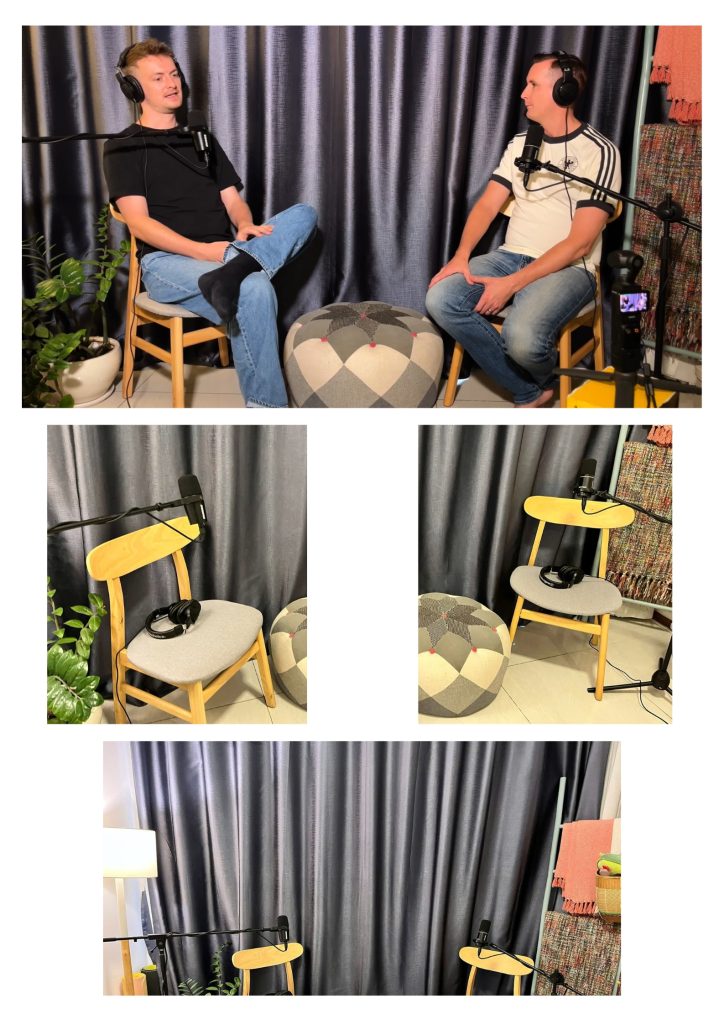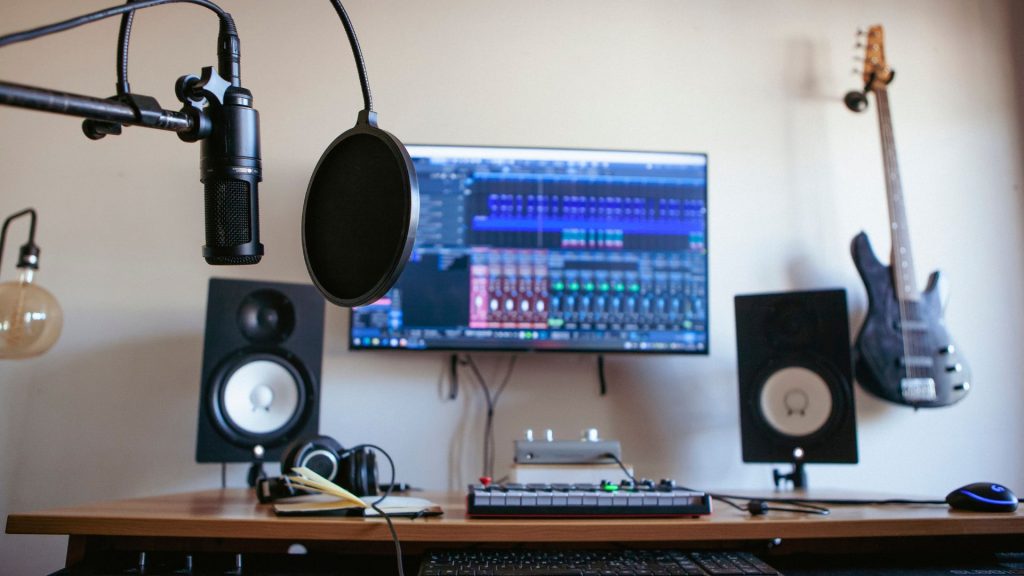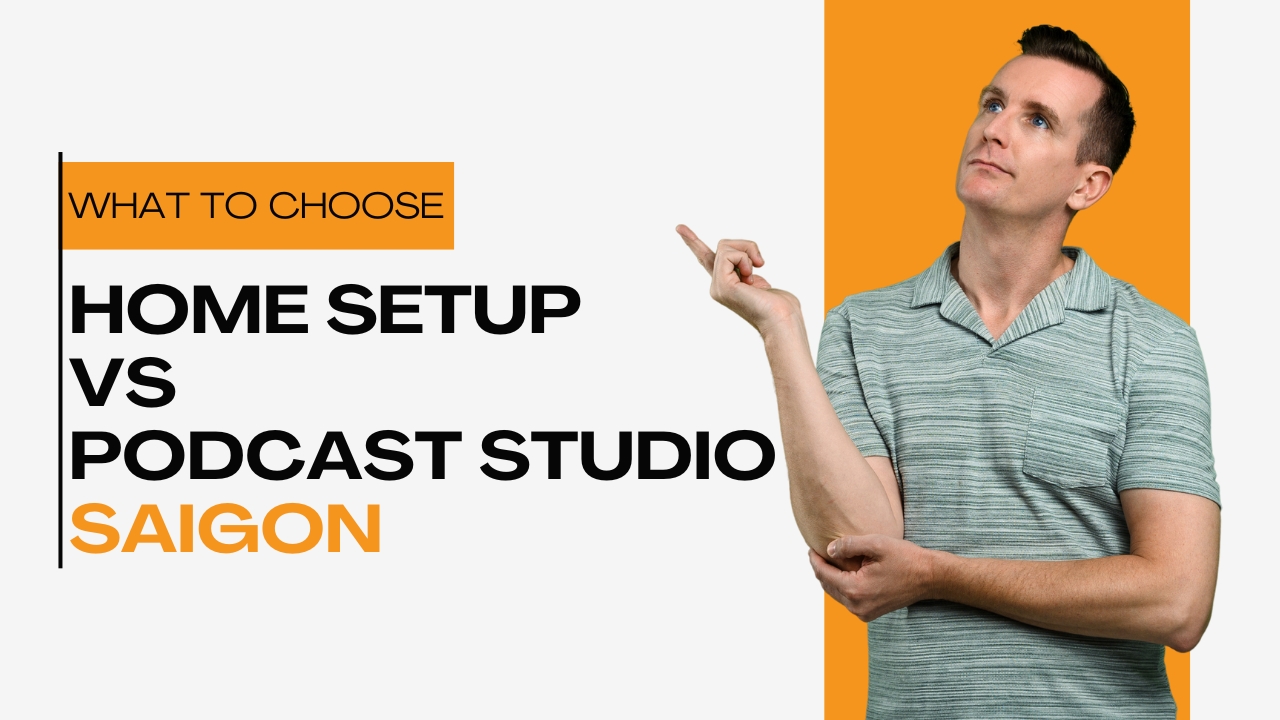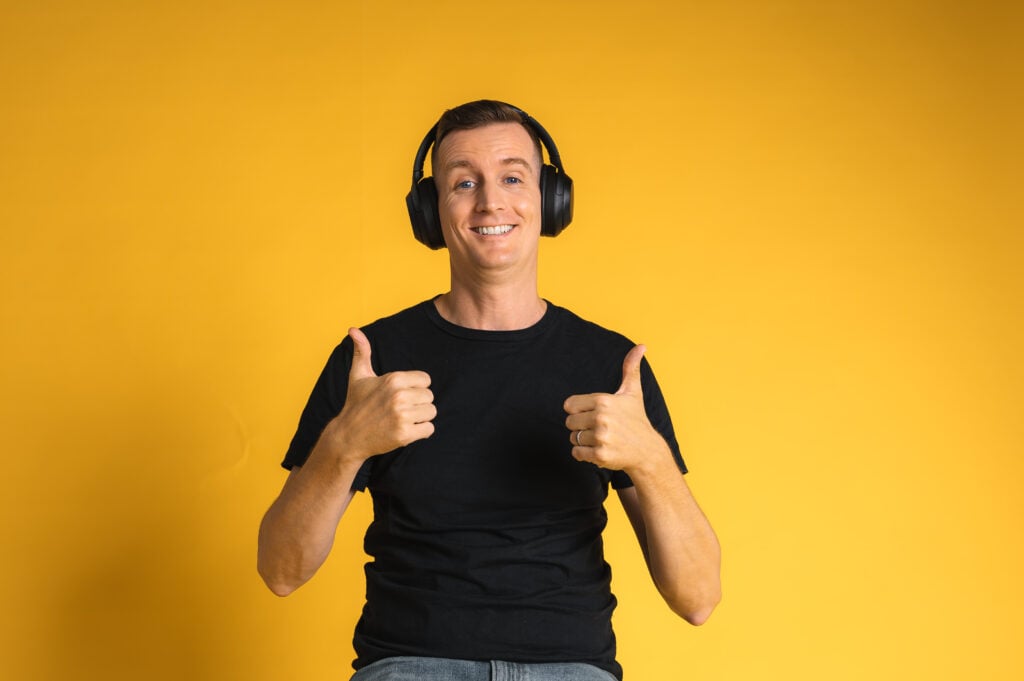When talking about podcasting, besides equipment and content, choosing the right place to hit record can decide the quality of your show.
My name is Naill, founder of Seven Million Bikes Podcasts. Podcasting for years has allowed me to try both a professional and a home podcast studio in Saigon.
Let’s compare the costs, convenience, equipment, sound quality, and real-world factors to help make the right decision between a podcast studio in Saigon vs Home setup.
Table of Contents
Podcast Studio in Saigon vs Home Setup: Pros and Cons and What To Choose
The choice between hiring a Podcast studio in Saigon vs home setup can significantly affect your sound quality, workflow, and even how your brand is perceived.
Let me help you go through each option’s pros and cons to see what is suitable for your podcast. My name is Niall Mackay, the Podcast Guy, and founder of Seven Million Bikes Podcasts. Podcasting for years has allowed me to try both a professional and a home podcast studio in Saigon.
Whether you’re just getting started or leveling up your show, this guide will give you the clarity to choose the right path forward.
Home Studio and Professional Studio: Key Differences
A home podcast studio is a self-made recording space—often in a bedroom, office, or spare room—where you record, edit, and produce your podcast using personal equipment. It’s the go-to option for many beginners, hobbyists, or anyone who values flexibility and affordability.
If you want to learn more about how to have your own podcast studio at home, read my old blog!
A professional podcast studio, on the other hand, is a dedicated space designed specifically for recording high-quality audio.
If you’re deciding whether to record at home or in a professional space, understanding the key differences between a home podcast studio and a podcast studio in Saigon is essential.

1. Sound Quality
This is perhaps the most important difference.
- Professional Studio -There are currently no dedicated podcast studios in Ho Chi Minh City
Sound quality in a professional podcast studio is typically far superior to that of a home setup. Music Studios in Saigon are designed with acoustic treatment, soundproofing, and professional-grade microphones, mixers, and preamps. This means you get clean, crisp audio with minimal background noise or echo.
These are not ideal to record a podcast in – if even possible.
- Home Studio
In contrast, recording a podcast at home can cause inconsistent audio if not set up right. Background noise, traffic sounds, or echo can easily creep into your recordings. You can improve this with foam panels or rugs, but it still won’t match a studio’s audio environment.
- Real Experience
In Vietnam, noise is a big problem: honking, motorbikes, street vendors, and even karaoke. And then there’s construction… I was about to record a podcast at home when construction started in the apartment below me, above me, and outside my apartment on different occasions! It was so loud it shook the floor—and made recording impossible. That’s when I realized I needed a professional studio.
2. Equipment & Technical Setup
- Professional Studio
A professional podcast studio comes fully equipped. No need to bring your own mics, audio interface, or cables—just walk in, sit down, and record. Some studios even provide video podcasting equipment and lighting if you’re producing content for YouTube or TikTok.
- Home Studio
Setting up at home means you’ll need to buy or borrow all your equipment and learn how to use it. For beginners, this can be overwhelming: from choosing a microphone to installing editing software, to troubleshooting audio problems.

3. Cost Comparison
- Profession Studio
When you hire a studio, the rental fee can range from $80 to $200 per hour.
In my podcast studio in Saigon, you can get a full episode recorded and edited for just $200.
If your podcast is an extension of your business or brand, studio costs are often outweighed by the results, especially when you consider consistency and listener experience.
- Home Studio
For even a basic audio-only setup, you’ll need to invest in a quality microphone, headphones, an audio interface, and some level of acoustic treatment (like foam panels or rugs). That alone can range from $500 to over $1,000, depending on the quality. If you plan to have a video podcast, the price can be higher. However, you need to invest your valuable time researching the gears, setting up the equipment, and even doing some post-production steps.
You can see the podcast recording checklist to estimate the cost.
4. Time and Workflow
In a home setup, everything takes longer: setup, testing, recording, editing, troubleshooting. And in Saigon, you’ll often waste time waiting for the noise to stop. However, you have full control over the schedule and time.
In a professional podcast studio, you walk in and hit record. The gear is ready, the environment is controlled, and often a sound engineer is available to assist. What used to take 4 hours at home might take just 1 hour in a studio, with far better quality.

5. Professionalism & Brand Image
If you’re podcasting to promote your business, build trust, or host interviews, then your setup becomes part of your brand. A quiet, well-lit, acoustically optimized space makes a difference, especially if you’re recording video content or collaborating with clients and guests.
A professional studio sends a message: “This podcast is worth listening to.” A home setup—unless expertly built—can sometimes feel amateur in comparison.
Pros and Cons
Let’s break down the pros and cons of each to help you make the best decision for your workflow, budget, and long-term goals.
Home Podcast Studio: Freedom with Frustration
A home podcast setup gives you the freedom to record whenever you want, at your own pace. There are no booking schedules, and once you invest in the gear, there’s no ongoing rental fee.
Advantages
- No Rental Fees: Once you invest in your equipment, recording at home doesn’t cost you anything. It’s ideal for those planning to produce a large volume of content over time.
- Record Anytime You Want: You have 24/7 access to your setup. Whether inspiration hits at 10 PM or 6 AM, your space is always available.
- Full Creative Control: From decoration to layout to gear upgrades, you can build your podcast space exactly how you want it.
- Comfortable and Private: Recording in your own space can feel more relaxed, which is great for solo shows or personal storytelling.
- Practice-Friendly: If you’re still learning the ropes, a home studio gives you time and space to practice without pressure or time limits.
Disadvantages
However, that freedom comes with responsibility—and some serious technical challenges.
- High Upfront Investment: Even a basic audio podcast setup includes a decent microphone, headphones, audio interface, boom arm, and soundproofing. Expect to spend $300–$1,000+. Add a camera, lights, and a backdrop for video, and the cost rises significantly.
- Noise Pollution in Saigon: Recording at home in Saigon is challenging. Between motorbike traffic, street vendors, karaoke from neighbors, and sudden construction, getting clean audio is tough.
- Soundproofing and Acoustics Are Difficult: Apartments and homes aren’t built with acoustics in mind. Echoes, background hum, and thin walls can ruin your recording unless you invest in heavy treatment.
- Time-Consuming: From setting up equipment to troubleshooting audio issues and editing, a home setup takes hours, especially if you’re new to podcast production.
- Unprofessional Visuals for Video Podcasts: Without proper lighting and staging, your video podcast may not look polished. This can affect how viewers perceive your brand.
Podcast Studio in Saigon: Professionalism Without the Headache
Advantages
A professional podcast studio offers a fully equipped environment for high-quality recordings. You just show up, record, and leave with studio-quality files. In a city like Saigon, this convenience can be a game-changer.
- Superior Sound Quality: Studios are acoustically treated and insulated from outside noise. You’ll get rich, clean audio that’s hard to achieve at home.
- Access to Professional Equipment: Top-tier microphones (like Shure SM7B or Rode NT1), mixers, cameras, lighting, and editing tools are included—no need to buy or maintain anything.
- Time Efficiency: There’s no setup or teardown. You walk in, press record, and focus on your content. The studio staff often assists with tech support and even editing.
- Ideal for Guests & Interviews: Meeting a guest in a neutral, professional environment is more comfortable and respectful than inviting them to your living room.
- High-Quality Video Production: Studios often have clean backgrounds, professional lighting, and camera setups, making your podcast video-ready for YouTube or social media.
- No Tech Hassles
Forget driver issues, cable problems, and random software bugs. Everything works—and if it doesn’t, there’s someone there to fix it. - Saves Editing Time
With better input comes less post-production. Clean recordings reduce time spent fixing noise, EQ issues, or syncing video and audio.

Disadvantages
- Less Flexibility: You need to book your session in advance. Spontaneous recordings aren’t always possible unless you have a studio subscription or package.
- Travel Required: You have to physically go to the studio, which means factoring in Saigon traffic. But once you’re there, the controlled environment is worth it.
Which one is for you
Choosing between a home podcast studio and a professional podcast studio depends on your goals, budget, and environment.
Home Podcast Studio
- Beginners or hobbyists who want to explore podcasting on a low budget.
- Creators who prefer flexibility and enjoy learning about gear, editing, and setup.
- Podcasters who don’t mind spending time setting up equipment and editing their own episodes.
- People with a quiet recording environment, such as a sound-treated room or minimal outside noise.
But keep in mind: recording a podcast at home in a city like Saigon comes with challenges—heavy traffic, construction noise, and unpredictable background sounds can ruin a great episode
Professional Podcast Studio
- Podcasters who prioritize quality, clean audio, proper lighting, multiple camera angles, and reliable tech.
- Business owners, branded shows, or creators with guests, where professionalism and first impressions matter.
- Those who want to save time—walk in, record, and leave with high-quality content, no hassle.
- Video podcasters who want a polished, visual setup without investing in cameras, lighting, or backdrops.
- Anyone who struggles with external noise and wants a quiet, soundproof space to focus.
Conclusion – Podcast Studio vs Home Setup
We have walked through the differences as well as the pros and cons of each option. Have you made your choice?
If you have just started or do a podcast just for fun, you should opt for a simple home studio. Otherwise, when podcasting is more than a hobby to you, or if you care about your brand image and audio quality, renting a studio might be the smartest move.
Want to sound your best without the stress? Book your next recording session at our podcast studio in Saigon. Let the pros handle the setup, so you can focus on your message.


